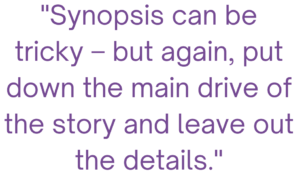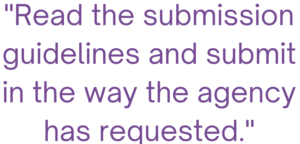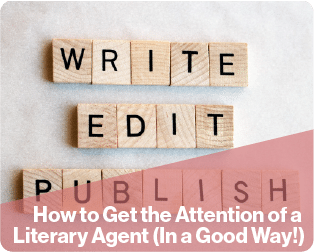How to Get the Attention of a Literary Agent (In a Good Way!)
Published on 06/07/2023How to Get the Attention of a Literary Agent (in a good way!)
Teacher: Lil Chase, Editor, Caroline Wakeman Literary Agency
Agents are busy people. They have books that need editing, contracts that need negotiating, and meetings meetings meetings. But, contrary to popular belief, they do want to hear from you! Agents are always on the search for new talent and the Next Big Thing.
So how do you get the attention of a very busy agent?
 Let’s start with that pitch. Writers often find writing pitches overwhelming – and we understand why! They need to be simple, to the point, and ideally written in the tone of the book you’re writing. i.e. if you’re writing a funny book, make the pitch sound fun. If you’re writing a mystery, make the pitch sound mysterious. Easier said than done! Convey, as simply as possible:
Let’s start with that pitch. Writers often find writing pitches overwhelming – and we understand why! They need to be simple, to the point, and ideally written in the tone of the book you’re writing. i.e. if you’re writing a funny book, make the pitch sound fun. If you’re writing a mystery, make the pitch sound mysterious. Easier said than done! Convey, as simply as possible:
- Your protagonist’s character: are they a geek(y) girl? Horrid like Henry? Or hungry like the caterpillar?
- Your protagonist’s goal: what will they be spending the book trying to achieve? Sniffing out the bad guy? Scooping a Britain’s Got Talent trophy? Snaffling the last cupcake when Dad’s not looking?
- Who or what is trying to stop them? Their parents? That very same bad guy? Their own crippling self-doubt?
- The setting: Is this story happening in World War One France? A fantasy land of your own imagining? Or a school on the road of any seemingly ordinary street?
It’s the combination of these elements that go into creating an interesting concept and an interesting book. Explain them succinctly, and you have our attention.
Once the agent has been intrigued by the pitch, they will read the manuscript with baited breath… They’ll start with the first sentence (where else?) so make it a good one. Then make the second sentence a good one, then the third, and so on and so on until the end.
But seriously, try to make your inciting incident happen in the first chapter, or be about to happen in the first chapter. Backstory – the details of who they are and where they live and who their family is etc – can come later.
 Synopsis can be tricky – but again, put down the main drive of the story ( your character going after their goal while someone or something tries to stop them) and leave out the details. Include the ending, or a hint of it. This isn’t like the blurb on the back of a book – we want to know what happens. Spoilers are okay.
Synopsis can be tricky – but again, put down the main drive of the story ( your character going after their goal while someone or something tries to stop them) and leave out the details. Include the ending, or a hint of it. This isn’t like the blurb on the back of a book – we want to know what happens. Spoilers are okay.
Lastly, and most importantly, read the submission guidelines and submit in the way the agency has requested. Don’t send YouTube clips of you reading your book. Don’t send links that could be riddled with viruses. Don’t send zip files or files in wacky formats. Don’t pop a hard copy in the post. (Unless that’s what’s been asked of you!) There’s one publisher (mentioning no names) that hides a secret password in their submission guidelines which authors must include in their covering emails. That way they know the guidelines have been read! What a clever trick!
We’ll finish up with this quote from George Orwell’s six rules on writing:
‘Rule 6: Break any of these rules sooner than say anything outright barbarous.’
By that, we mean – each book is different and might catch our attention for an unexpected reason. There are no real rules about what makes a good book stand out. If you think it’s good, and when you’re sure it’s ready, send it out into the world to seek its fortune. Best of luck!
For more free tips for how to improve your writing for children’s books subscribe to our ITSme Learning Newsletter!
Other News
What Happens in an ITSme Mentorship? A Week-by-Week Breakdown
Imagine having a guide who not only understands the creative path an individual wants to walk, but also has the knowledge and tools to help them get there – successfully. That’s the core of the ITSme Learning Mentorship. Whether someone is a student, a young professional at the beginning of their career, or an artist…
Announcing Our Very First Picture Book Course!
We are extremely excited to announce our first picture book class and mentorship program, in a collaboration between Caroline Wakeman Literary Agency and multi-talented author-illustrator Sally Anne Garland. Your Picture Book Journey: How to Write and Illustrate Your Own Picture Book is a 12-week course for writers, illustrators, and visual storytellers ready to bring their…
Why Every Illustrator Portfolio Needs a Stand-Out Character (Yes, Even Yours)
When you’re thinking about our favourite stories as a child, we often think about the narrative, the themes, perhaps a particular quote that stood out, but the most memorable elements are always the characters. The reason the characters always stay in our minds is because they are the gateway to the narrative, and all of…
Trend Watch: YA Illustrated Covers
Over the past few years, illustrated covers have become a defining visual language in the Young Adult (YA) and New Adult (NA) book market. And no, this isn’t just a passing trend—it’s a design evolution powered by the viral force of #BookTok, #bookgirlies, and a growing appetite for genre-fluid storytelling. Hear what’s driving the…
Trend Watch: The Graphic Novel Boom
Every week we’ll be featuring a new article over on LinkedIn, in our new trend watch series! Graphic novels are having a moment—and it’s no passing trend. From classrooms to bestseller lists, graphic novels are dominating shelves and reading time across all ages. What was once seen as a niche format with a distinct, heavy-lined “comic book”…
Bologna 2025: A Week of Connection
By: Vicky Patoulioti, Talent Source Manager, ITSme This year’s Bologna Children’s Book Fair was one to remember. From early mornings to late evenings, our team Vicky, Bhavi, Ed, and Emily — were on the ground offering free portfolio reviews to artists from all over the world. Mornings kicked off with pre-scheduled reviews, while in the…




